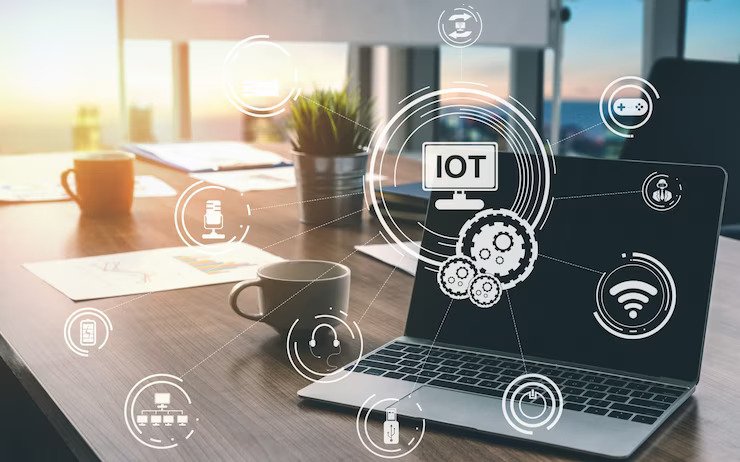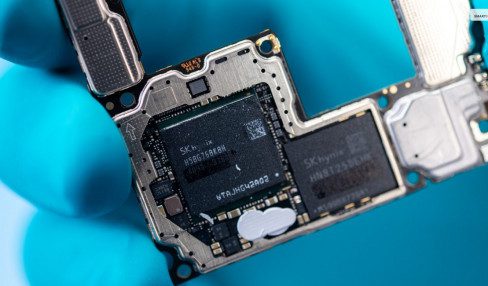How the Iot Technology Could Push Your Business to New Heights
5 Mins Read
Published on: 15 March 2023
Last Updated on: 27 May 2025

toc impalement
Emerging technologies, such as artificial intelligence, robotics, quantum computing, etc., have changed how businesses around the globe operate.
These technological innovations are based on advanced algorithms. These algorithms have the power to transform industries completely. For example, eliminating human error, increasing workplace productivity, cutting expenses, etc.
However, we can’t discuss all of them in a single article. Therefore, we’ll focus on one of the most prominent: the Internet of Things, or IoT.
This technology has already started its journey towards complete digital transformation. It can change how large, small, and midsize businesses use devices in the working environment.
Benefits of IoT Business
The IoT industry has made some considerable changes in the business landscape. The module has revolutionized how data is transmitted across spaces and network arrays.
Hence, manufacturers can make more pertinent decisions and develop more meaningful processes by collecting all their data in a single place.
Nonetheless, IoT is far from being just about manufacturing. According to statistics, 83% of organizations spanning a range of areas have seen improvements in their operations and productivity.
Most businesses that have embraced IoT have also confirmed returns on their IoT investment. Therefore, there is no room for doubt: IoT is here to stay.
If you’re still weighing, here’s a list of undeniable advantages of IoT that will shed some light on its benefits.
1. Increased Productivity and Profitability:
IoT helps increase productivity in the workplace through automation. This technology automates time-consuming and repetitive tasks, such as inventory management and data entry.
Human resources can also be transferred to more meaningful or complex duties. Duties that demand out-of-the-box thinking or other individual skills that algorithms can’t support.
Another example of tedious tasks involves PDF editing and archiving. However, if you have an IoT-enabled device that removes the obstacles associated with this, you can increase not only documentation speeds but also communication between departments.
Another reason more and more companies are implementing IoT technology in their business operations is that it provides real-time insights, making tracking more accessible and faster. Thereby, bottlenecks or areas for development can be spotted in advance.
However, if you implement this technology for the first time, ensure you train your staff properly. Employee training is an essential part of any successful and smooth-running company, especially in this technological era.
Since many innovations have emerged as robust tools for business operations optimization, your staff needs thorough training on using and controlling them for maximum productivity and top-notch safety.
Fortunately, there are a lot of options in this sense, from online courses and one-on-one meetings to workshops and mentoring programs. Courses like ITIL v4 Foundation, for example, can help your team navigate today’s technological advancements, including artificial intelligence and IoT, providing insightful information and instructions on how to make the most of them.
2. Optimal Asset Utilization and Tracking:
The automated monitoring and scheduling that comes with IoT technologies allow for better use of resources and assets. That could mean everything from enhanced water consumption to power management.
Smart motion detectors can significantly cut water and electricity expenses, promoting a more productive and sustainable business model. Autonomous control and real-time insights help companies make the most of their assets.
Asset-heavy industries, in particular, have implemented IoT for better transparency through location and more meaningful updates.
Asset tracking IoT solutions further enhance operational efficiency by providing precise, real-time data on asset location and usage. These technologies enable businesses to minimize downtime, prevent loss, and streamline logistics across various operational areas.
3. Reduced Costs:

One of IoT’s most significant advantages refers to streamlining. Streamlined operations further promote cost reduction, helping companies specialized in production, supply chain, manufacturing, etc., saving precious time and money.
The manufacturing industry, in particular, benefits from this innovation, reducing downtime by up to 20-50% and saving 5-10 maintenance costs.
IoT sensor-based devices can keep machinery and equipment running at peak functionality, and manufacturers can control them more easily.
Nevertheless, IoT technologies can be customized to help a myriad of businesses. The range expands from healthcare and logistics to agriculture and supply chain management.
4. Enhanced Security Levels:
If there is something that businesses have undoubtedly learned in recent years is that the Internet can be both their friend and enemy.
Any vulnerability in this digital era can not only cause companies to lose profits but also make them a target for the many cybercriminals out there.
By implementing IoT-enabled devices, tools, and equipment, organizations can finally address this problem, but this doesn’t mean they need no other protection measures in place.
All these devices should be equipped with the right security software. Software that is tailored to each business’s needs and requirements.
IoT also contributes to enhanced safety in physical locations. A network of IoT devices, such as motion sensors and surveillance cameras, can improve an organization’s security and keep thieves or other malicious actors away. This network can be further enhanced with the right knowledge.
5. Business Opportunities:
While many companies aim to generate revenue from their digital services, just a few use a cohesive strategy in this regard. If you’re dealing with the same problem, IoT could be just what you need to push your company forward.
Smart utility grids, artificial intelligence, and advanced analytics will allow you to provide the quality of services your clients seek by gathering actionable data.
Having all the needed information in a single and safe place further helps you identify potential issues and develop business models that align with your industry or audience’s requirements.
IoT can be used in various ways to make your voice heard in this competitive market. For instance, IoT sensors on automobiles can monitor different driving habits and speeds.
Furthermore, allowing insurers to enhance rates on automobile insurance. In retail, on the other hand, IoT can be utilized to assess in-store foot traffic. Hence, optimize displays to meet customers’ needs and habits.
And It’s A Wrap!
Many companies already use IoT to increase the quality of their products and services. This not only saves them time and money but also makes them more competitive and attractive to investors.
Improved customer experience and thorough marketing are other notable upsides IoT can bring to your business. Hence, ensure you consider implementing this revolutionizing technology.
Read Also:


















Comments Are Closed For This Article